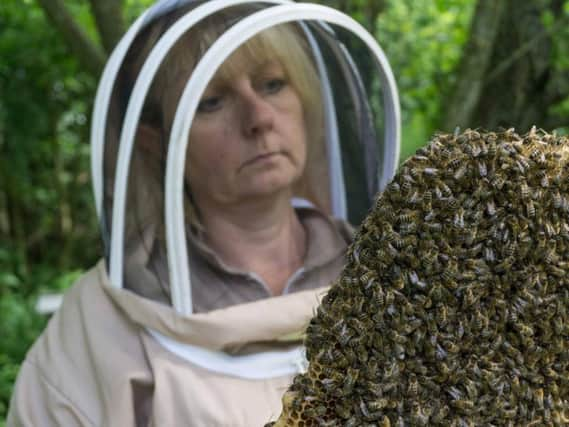Town abuzz with beekeeping work


In a bid to encourage pollinators across the region, beekeeper Kath Cordingley has been working with Friends of the Earth to establish sites full of nectar.And that includes Wiggins Farm in Standish.
Kath said: “Friends of the Earth approached us to help in their aim to create a corridor for bees to pollinate as they travel.
Advertisement
Hide AdAdvertisement
Hide Ad“Bees can only fly for up to three miles before they need to stop off for a rest. If we have these Bee World gardens, they can do that and pollinate.
“The initial preparation work has started, with a bunch of volunteers, able-bodied and disabled, weeding the existing bed and preparing the soil ready for planting.
“We had pupils from various schools coming in to plant up the bed with a mix of wildflowers especially chosen for bees. In addition to this, we are helping to set up areas around schools for planting bee-friendly gardens.
“The owner of Wiggins Farm has planted 60 acres of wildflowers which are high in nectar, so we have a lot of bees there. He also grows oilseed rape, which we sell at The Bee Centre.
Advertisement
Hide AdAdvertisement
Hide Ad“Friends of the Earth have a number of these Bee Worlds across UK and we are very honoured to have been chosen to host the latest one.”
For Kath, bee keeping has become a relatively new pastime and it all started with a birthday gift.
She said: “Simon bought me a course for my 44th birthday to see if I would like it and it soon turned into a hobby and obsession. I just love bees - they are fascinating creatures. I love the way they arrange themselves in the hive. They are very efficient in what they do. It is all so fascinating.
“There was a bee centre at Samlesbury Hall, in Preston, but it was just a building with information boards.
Advertisement
Hide AdAdvertisement
Hide Ad“So Simon and I took charge of it in October last year and we do talks and demonstrations every Wednesday and Sunday and through the school holidays.
“We explain how important they are and we have a 6ft observation hive and we show people what bees do.
“We have honey-tasting and we run courses for people.
“We allow people to put on the protective suits and they go outside to the apiaries. We have a half-acre garden there which we can use to open the hives so we can inspect the bees.
“We raise awareness of the valuable roles honeybees play in supporting our economy and our environment and we host events to discuss this.
Advertisement
Hide AdAdvertisement
Hide Ad“We also look at bee pollination. We have a breeding programme on how to raise the queen bee and reduce the amount of imported bees from other countries so we can reduce diseases associated with bees.”